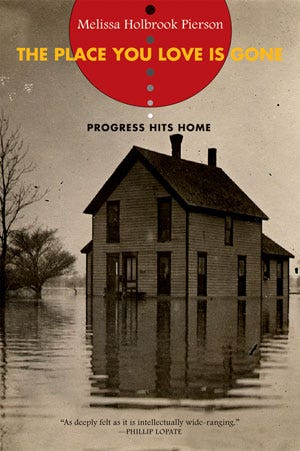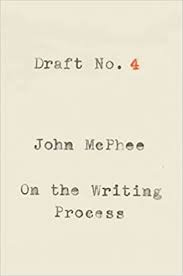Reading List
And a question
Dear readers,
I read a lot. Most of my reading is not bread-centric, especially as I’m working toward a book that considers American bread inside broader American histories, of housing, and ideas about home. I gobble books, sleuthing for structure, and seeking understanding and distraction.
I have a question: would you pay to see glimpses of this process, and support my work? I’m thinking of offering 2 posts a month for paid subscribers, one about research, and one excerpt from my writing. The annual fee I’m considering is $30; the monthly charge would be $5, which is the minimum Substack allows.
Please let me know what you think of this concept – and tell me what you are reading!
Yours, Amy
The Place You Love is Gone by Melissa Holbrook Pierson
I can’t recall how I found this book but I’m so very glad I did. Divided into three sections, the book is a history of three places the author has lived: Akron, Ohio, Hoboken, New Jersey and the Catskill Mountains in New York State. I adore how she poetically examines her life and her places.
Sourdough Culture: A History of Bread Making from Ancient to Modern Bakers by Eric Pallant
This book is a great inquiry into sourdough history. I wrongly assumed that because Pallant is a professor, the book would be unapproachable. But his trek to find the source of his starter is engaging and fun. I LOVED the chapter on yeast! The audio book is coming out this month, too.
Summer Kitchens by Olia Hercules
I’ve already raved about this book and I am going to again. I love her writing, and her cookbooks are gorgeous. Now that we are two terrible, unbelievable months into Russia’s invasion of Ukraine, I look at Summer Kitchens: Recipes and Reminiscences from Every Corner of Ukraine as a memorial. It was a snapshot, catching something that maybe progress would steal – but the thief is far more treacherous. Another book of hers, Kaukasis, has a luscious, melancholy tone, catching the way people cling to food traditions in post USSR places. Hercules has started a Patreon to create a private channel for her cooking writing and instructions, and to continue fundraising for Ukraine.
What Can a Body Do? How We Meet the Built World By Sara Hendren
This exploration of how the built environment needs is interpreted by people who are living with disabilities is terrific. We able-bodied folks are only temporarily so – I learned this when my dad had strokes 17 years before he died; his new relationship to his body sent me reading and writing. I am so glad to have found this book, and to have stepped back into this kind of dialogue. Learning about the roots of the Independent Living Movement, at the University of California Berkeley, is just one great fact and consideration that’s staying with me.
Nightbitch by Rachel Yoder
When I told my sister about this novel, and how a stay-at-home-mother turns into a dog, she understood immediately why I loved it. “Bet you wish you wrote it!” she said, and she’s correct – but I’m not jealous, just thrilled by this dark page-turner of the magical realist sort. This is a grand commentary on motherhood and society that I wish I could have read when I was a new mother, muddling through a morass of physical and social cues.
A Ghost in the Throat by Doireann Ní Ghríofa
I read this book in January and have lived with a hangover ever since. This book is a wild ride, another intimate dive into motherhood, paired with the narrator’s obsession with an 18th century Irish poet. Eibhlín Dubh Ní Chonaill’s epic poem is famous in Ireland but her life is obscured by the fact of her gender. This book digs for her truths, and comes up with amazing pearls about what it is to be a woman and mother.
A Tale for the Time Being by Ruth Ozeki
This novel weaves together diaries of Japanese and Japanese Americans. The weaver is a writer named Ruth, who dives into the diaries she finds on the shore of the British Columbia island where she lives, flotsam, perhaps from the 2011 tsunami. I admire the fabric of this book, and the many threads that bring multiple voices and experiences to the reader.
Time is a Mother by Ocean Vuong
This is a book of poetry I’m just beginning to read – pacing myself. Vuong is an incredible writer. The lyricism of his novel On Earth We’re Briefly Gorgeous really floored me, as did the interview he did with Krista Tippett. These poems reckon with the loss and love, and the language is rich and brilliant, words leaping from the cliffs of feelings and making each poem feel wild and epic.
Body Work: The Radical Power of Personal Narrative by Melissa Febos
This book is a potent guide through the challenges of writing. Don’t avoid yourself, Febos advises. I’m already re-reading.
“The story that comes calling might be your own and it might not go away if you don’t open the door. I only believe in fear. And you can be afraid and write something.” – Melissa Febos, Body Work
Draft No. 4 by John McPhee
Another very helpful book about writing. McPhee brings readers through sprawling, specific nonfiction universes. Food writers love his book Oranges, for the way it carries you thoroughly through this fruit and its life. My son Felix loves Uncommon Carriers, for the zigzag tours it makes on various passages, land and sea. I’m very fond of Heirs of General Practice, and of this book. Seeing how he works to create structures that hold all the information and characters he collects is instructive.





